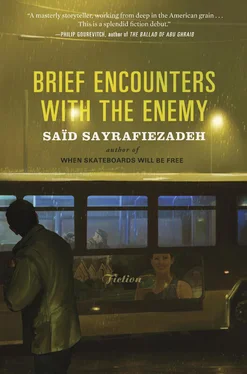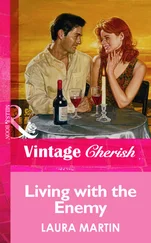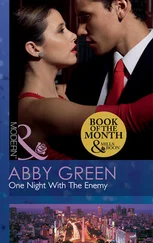While I waited, I could feel a prodigious amount of silent time slipping past. My mind wandered dangerously. It began to fade. I realized how jet-lagged I was. The manual had cautioned about fatigue. I became absorbed in the dioramas, little resting Newton being crowned by a clay apple, and I contemplated what historical events came after 1959 and how much work it would be for me to piece those events together. Through the window, I could see the gray sky hovering over the edge of the woods. The sprinklers oscillated across the baseball field, shuck, shuck, shuck was their sound, their reach long and powerful, and most of the time they missed the field altogether and shot straight into the pond.
Finally, mercifully, a little girl in the back row raised her hand. Her name was Bethany and she wore a gold ribbon in her hair and sat with perfect posture. “Bethany is bright, introspective …”
“Yes, Bethany?” I said.
“Is Mrs. Tannehill sick?”
It was three weeks after I’d gotten home that I was finally able to see Molly. It was supposed to have been only two weeks, but that’s the nature of an affair. We’d had a few phone conversations along the way, breathy and furtive and yearning, and each time she’d had to hang up in the middle. “I’m trying my best, honey,” she’d promised. But she didn’t seem all that bothered. This was not how I’d envisioned my homecoming.
She arrived on a Saturday afternoon with Lola. They were en route to a pottery class and had one hour to spare. Lola leaped into my arms straightaway. At least she was happy to see me. “What’d you bring me?” she wanted to know. She was heavy in my arms. She’d become a little woman. I wanted to bury my face in her neck and weep at the passage of time. I wanted her mother to see how much I had missed them.
“I was at war,” I said. “I didn’t bring you anything.”
She shrugged. She jumped from my arms onto the futon. She jumped up and down on the futon. The futon was pushed against the wall and doubled as a couch, in the same way that my desk doubled as a table. My kitchen cabinets doubled as a place to file papers. This was life in an efficiency. With three people it was crowded.
“Don’t jump on the bed,” Molly said.
“It doesn’t matter,” I said. I wanted to be permissive.
Molly let me kiss her on the cheek. It was a casual, platonic, meaningless kiss that I had perfected. Molly wanted to make sure Lola was protected from the effects of “our transgression.” If Lola were ever to innocently mention something to her father, it could be explained away as a harmless kiss from a harmless friend. “Mommy’s old friend Jake.” “Mommy’s dear friend Jake.” That was the parameter we worked within. We’d been working within it for three years. In three years, Lola had never said anything to her father. She seemed to notice nothing and be affected by nothing. As far as I could tell, she seemed to love me. I often wondered if she loved me most of all and was aiding and abetting us, perhaps unconsciously, because I was the one she really wanted as her father. “He’s absentee,” Molly had told me when we first met. She didn’t mean that her husband traveled, she meant that he was emotionless and humorless. He was an entrepreneur. He owned shopping malls or shopping centers. “I’m trying to help the world,” she said he’d tell her. He spent his weekends on the phone.
We sat around my desk/table, the three of us, eating muffins that I’d bought for our reunion. Lola wanted to eat only the tops of the muffins. “The muffinheads,” she called them. She pulled them apart, stuffed the heads in her mouth, and put the unwanted portion back on the plate. She was disgusting.
“Eat the whole thing,” Molly instructed.
“It doesn’t matter,” I said. I wanted to be the good guy.
Six muffins later, Lola had to use the bathroom. The moment the door was closed, I pulled Molly onto my lap. Her body was warm and her hair fell in my face. “No, no, no,” she cooed, but she straddled me anyway. She was always sure to offer resistance. The resistance only increased the desire, of course, but it seemed to put her mind at ease and resolve the moral dilemma.
She’d married too young. That was the dilemma. She’d had Lola too young. That was another dilemma. She’d wanted to be an artist — now she was thirty-eight and a housewife.
“It’s too late,” she’d tell me.
“No,” I’d say, “it’s never too late.” But I didn’t really believe it myself.
We’d met by chance at a museum three years ago. She’d had her sketch pad and I’d had my students. I’d brought them on a field trip to show them a traveling exhibit of antiquities from the Ottoman Empire. They were disinterested and I was distracted. Molly kept walking past with her high heels and her hoop earrings and her red hair. I tried my best not to have my students catch me looking at her ass. I’d shown off in front of her by doing an imitation of Mehmed II. The class had roared and she had smiled. They loved me, those students. They would do anything I wanted, answer any question I asked. As we were leaving, I happened to run into her at the coat check. “If you ever want a guided tour …” I said. I had no idea she’d take me up on it. I had no idea she was married. A week later we were back at the museum. She’d brought her sketch pad again. In truth, she was the expert, telling me about the artwork and the artists and the brushstroke. She showed me some of her own drawings. They weren’t of paintings and sculptures but of people looking at paintings and sculptures. She was obviously talented. “They’re amazing,” I said. “Do you really think so?” she said. We sat close to each other in front of Monet’s water lilies while she talked for twenty minutes about the painter’s failing eyesight. I was fixated on her hip pressing against my hip. Later we made out in my car, and when we were done, she pulled her wedding ring out of her pocket. It had one huge diamond. “I’ve never done anything like this before,” she said. She thought that would be the end of us, but it wasn’t. I didn’t care about any nameless, faceless husband. It was every man for himself in this world.
We’d seen each other about once a month since then, sometimes twice a month. We avoided phone calls, we deleted emails, we met at out-of-the-way places. Once, when her husband was preoccupied, we managed to see each other two days in a row. We took Lola to the circus on Saturday and the amusement park on Sunday. It was like we were a family, or trying to be a family, laughing and sliding down the water slide. It had seemed like a grand achievement at the time not to exhibit any trace of desire. “Mommy’s friend Jake.”
Now Molly was on my lap. Her legs wrapped around me. Her skirt rode up high.
“Come back,” I gasped.
“I will,” she whispered.
“When?” I asked.
“Soon,” she said.
“How soon?”
By the time Lola came tearing out of the bathroom, flinging herself on my couch/bed, and screaming, “Let’s play war!” Molly and I were sitting in our respective seats talking about the weather. We were pros.

The days were getting longer and warmer, but the sky was overcast and it still hadn’t rained. To get to school each morning, I drove over the bridge heading east. Down along the river, I could see the factories all in a row, their smokestacks going. A few of them had closed since the war had ended. That was an unintended consequence of the peace. The people who had come in from the outskirts for work were heading back to the outskirts.
As for my classroom, it was established that the students hated me. Even those Mrs. Tannehill had described as “loving,” “caring,” “forgiving” loathed me. In the beginning I tried to curry favor by handing out candy from a large glass jar that I kept on my desk — a blatant disregard of teaching ethics — but it didn’t achieve the desired result. The children would eat the candy sullenly and in a manner of obligation. I had become the enemy in their eyes, and even when the enemy gives something good, it is received with suspicion and resentment. Naturally, I began to hate them in return. I fantasized about failing them, each and every one. I would fail them through no shortcoming in their classwork, but it would serve them right all the same. I would teach them a lesson about the vagaries and the violence of the real world. Unfortunately, failing them would require more work from me than passing them. It would require written explanations and conferences with parents. Dr. Dave would want to know what had gone wrong and where. In the end, it would be simpler to pass them. A’s across the board. But those A’s would come at a price. There would be no drawings, no dioramas, no excursions to museums. No candy. In short, no fun. That would be our pact. If I were the enemy in their eyes, then I would play the role of the enemy.
Читать дальше













